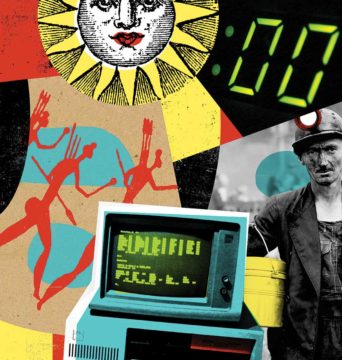 Aaron Benanav in The Nation (Illustration by Tim Robinson):
Aaron Benanav in The Nation (Illustration by Tim Robinson):
We have named the era of runaway climate change the “Anthropocene,” which tells you everything you need to know about how we understand our tragic nature. Human beings are apparently insatiable consuming machines; we are eating our way right through the biosphere. The term seems to suggest that the relentless expansion of the world economy, which the extraction and burning of fossil fuels has made possible, is hard-wired into our DNA. Seen from this perspective, attempting to reverse course on global warming is likely to be a fool’s errand. But is unending economic growth really a defining feature of what it means to be human?
For the longest part of our history, humans lived as hunter-gatherers who neither experienced economic growth nor worried about its absence. Instead of working many hours each day in order to acquire as much as possible, our nature—insofar as we have one—has been to do the minimum amount of work necessary to underwrite a good life.
This is the central claim of the South African anthropologist James Suzman’s new book, Work: A Deep History, From the Stone Age to the Age of Robots, in which he asks whether we might learn to live like our ancestors did—that is, to value free time over money. Answering that question takes him on a 300-millennium journey through humanity’s existence.
More here.
